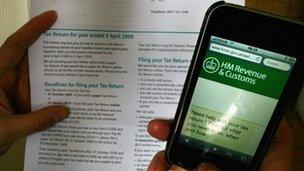HMRC hails three tax avoidance victories
- Published

HMRC is keen to scare people away from complex and apparently legal tax avoidance schemes
HM Revenue and Customs (HMRC) has trumpeted three victories in the courts last month against complex tax avoidance schemes.
The Revenue said the decisions had potentially stopped as much as ôÈ200m being lost.
Its director general of business tax, Jim Harra, said: "HMRC will challenge tax avoidance relentlessly."
However, Mike Warburton of accountants Grant Thornton said HMRC was not winning every case that came to court.
"It may be that they are winning at the moment, but that is not always the case and three does not make a trend," he said.
"Having said that, it is undoubtedly the case that the courts have been finding against complex tax avoidance schemes.
"But in these three cases the Revenue has won for quite different reasons," he added.
'Firing a broadside'
One of the three cases was heard in the Court of Appeal and involved an artificial scheme, back in 2003-04, to avoid capital gains tax on the ôÈ10m profit from the sale of a business.
The two other cases were dealt with by tax tribunals, part of the judicial tribunal system, that deal with tax law cases.
Mr Harra said: "We have now had three major court successes in avoidance cases in the last month alone and I hope this sends a very clear message: These schemes don't come cheap, you carry a serious risk that you'll end up paying the tax and interest on top of a set-up charge which can run into the hundreds of thousands of pounds."
John Whiting, of the Chartered Institute of Taxation (CIOT), said: "There is a message here to taxpayers that HMRC has not gone soft, but these cases are part of the normal ebb and flow - you win some, you lose some."
But Ronnie Ludwig, at accountants Saffery Champness, said HMRC was firing a broadside at all such schemes.
"This shows they are determined to take a stand against complex tax avoidance schemes," he said.
HMRC has been engaged in a renewed drive to recover unpaid tax since 2005, when it first won the power to flush out untaxed income hidden in offshore bank accounts.
More recently it has published photographs of the top-20 most wanted criminals who have dodged tax, typically by VAT frauds or smuggling cigarettes.
Earlier this month it sent penalty notices to about 500,000 people, demanding they pay up at least ôÈ1,200 each for failing to submit their self-assessment tax returns.
But it was also criticised last year by MPs on the public accounts committee for supposedly cutting "cosy" deals to settle the complicated tax affairs of big companies such as Vodafone and Goldman Sachs.
More recently though, the National Audit Office found that five of those big settlements had been reasonable.